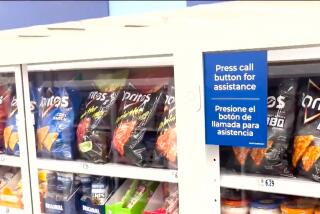Target, Rite Aid, Walgreens refill drugs without OK, patients say
Ivor Davis received a call recently from the Target pharmacy near his home in Ventura. He was informed he could pick up a refill of medication for his wife, Sally, who is battling pancreatic cancer.
Davis, 74, told me he and his wife like to be flexible in deciding where and when they purchase her drugs. Sometimes they refill prescriptions during visits to Seattle. Sometimes Davis crosses the border into Canada, where the usual $166 cost for Sally’s pills can be cut in half.
They never ask any pharmacy to refill an order until they’re ready, which is why Target’s call came as such a surprise.
“They just went ahead and did it without our knowing,” Davis said.
His experience mirrors those of other Target customers — as well as those of Rite Aid and Walgreens — who contacted me after I reported how CVS Caremark was refilling prescriptions and submitting claims to insurers without patients’ approval.
The incidents suggest that most leading drugstore chains have similar practices as they compete to lock in steady business, and revenue, through automatic refills.
The U.S. Justice Department’s civil fraud division said last week that it was joining investigators from the Department of Health and Human Services in determining whether CVS’ actions amounted to Medicare fraud.
Regulators in California and New Jersey also have said they’ve launched probes.
If, as it seems, other drugstore chains have quotas for pharmacists and are refilling prescriptions without patients’ permission, federal and state officials may have to cast a wider net.
“It’s important to see how common this practice is and what it’s doing to drug and insurance costs,” said Laura Etherton, healthcare policy analyst for the U.S. Public Interest Research Group. “Refilling prescriptions when consumers don’t need them is money down the drain.”
I reported last week how documents from a May meeting of CVS pharmacists detailed the quotas employees are expected to hit if they expect raises and bonuses. CVS instructed pharmacists to enroll at least 40% of patients into the company’s automatic-refill program, ReadyFill.
CVS spokesman Mike DeAngelis has consistently denied that quotas exist or that pharmacists’ compensation is determined by such yardsticks. He also insisted that customers’ permission is always required before they can be enrolled in ReadyFill.
Representatives of other drugstore chains said pretty much the same.
“Target’s Auto Refill is an opt-in-only program, and we will only automatically refill guests’ prescriptions once they have registered that prescription in our Auto Refills program,” said Jamie Bastian, a Target spokeswoman.
Jim Cohn, a Walgreens spokesman, said the company’s pharmacists encourage patients to have automatic refills for so-called maintenance medications.
“However, there are no corporate quotas or incentives for our pharmacy staff for new enrollments,” he said. “These are opt-in services only, and patient consent is required for enrollment in any of our auto-refill programs.”
Ashley Flower, a Rite Aid spokeswoman, said no refills, automatic or otherwise, are made without patient approval. “Rite Aid pharmacists are not authorized to produce non-patient-requested refills,” she said.
Apparently, no one told that to Karri Lucas-Tinter’s’ Rite Aid pharmacist. Lucas, 39, of the Van Nuys area, said that not only has she had medication refilled without her permission twice in recent months, but the refills contained only three weeks’ worth of pills instead of the prescribed four.
“At first, they insisted that they were right about both my asking for the refill and the number of pills,” she told me. “But they finally acknowledged that they were wrong about both.”
A Rite Aid pharmacist in Pennsylvania, who requested anonymity because of fear that he could lose his job, said his company, like CVS, expects 40% of patients to be signed up for automatic refills.
“We get in trouble if we don’t meet the quota,” the pharmacist said. “If you come up short, you are doomed to attend a meeting usually far away to get reprimanded verbally by your boss.”
He called enrolling patients in automatic-refill programs without permission “a widespread practice.”
Doris Silsbee, 90, of Inglewood, said she received a call from Walgreens last month informing her that her refill was ready.
Problem was, she’s never been a Walgreens customer. Silsbee always ordered her medication for a stomach condition from the pharmacy benefit manager Medco Health Solutions, which was acquired by Express Scripts in a $29-billion deal earlier this year.
In July, Express Scripts and Walgreens settled a long-running dispute over reimbursement rates. Express Scripts customers could once again fill prescriptions at Walgreens as of September.
“Walgreens had the right medication, the right doctor’s name,” Silsbee said. “But I have never, ever filled a prescription at Walgreens.”
Brian Henry, a spokesman for Express Scripts, said he had no explanation for how this could have happened. He did acknowledge, however, that Walgreens pharmacists began calling Express Scripts customers in September to let them know their business was welcome again.
Federal and state authorities said they’re coordinating their investigations into refill practices. Complaints can be filed with the California Board of Pharmacy at https://www.pharmacy.ca.gov.
David Lazarus’ column runs Tuesdays and Fridays. He also can be seen daily on KTLA-TV Channel 5 and followed on Twitter @Davidlaz. Send tips or feedback to david.lazarus@latimes.com.
More to Read
Inside the business of entertainment
The Wide Shot brings you news, analysis and insights on everything from streaming wars to production — and what it all means for the future.
You may occasionally receive promotional content from the Los Angeles Times.











